
To kick off our week of coverage from the COP30 climate summit in Brazil, we play video of a major protest that took place Saturday, when tens of thousands of people took to the streets of the host city Belém to demand urgent climate action. The Indigenous-led action was the first major climate protest at a United Nations climate conference since 2021; protests were banned by Egypt, the United Arab Emirates and Azerbaijan, the three previous host countries. Demonstrators denounced corporate greed, war and imperialism, while demanding urgent action to reduce use of fossil fuels and to respect Indigenous sovereignty. “The answer is us,” said Lucía Ixchíu, a Maya K’iche’ environmental defender. “We know that we have the solutions.”
Transcript
AMY GOODMAN: We’re broadcasting from the U.N. climate summit — that’s COP30 — from the Brazilian city of Belém. It’s the gateway to the Amazon. Leaders and delegates from more than 190 countries have entered a second week of negotiations. On Saturday, Democracy Now! was in the streets of Belém as tens of thousands of protesters gathered demanding urgent climate action. The Great People’s March was the first major climate protest at a U.N. climate summit since 2021. The three previous climate summits were hosted by nations that ban public actions: Egypt, the United Arab Emirates and Azerbaijan.
MARÍA INÉS TARACENA: We’re in the streets of Belém, where the U.N. climate summit is taking place. We’re halfway through the negotiations of CO30. It’s a Saturday. Thousands of people have taken to the streets demanding urgent climate action. We spoke to several of them.
GIOVANI DEL PRETE: My name is Giovani del Prete. I’m from Brazil, from São Paulo. I’m here with all the people from world. We have here gathered more than 60 countries here. And we have gathered in UFPA University the real COP summit here, the People’s Summit, in the university here of the state of Pará. We have gathered there 30,000 people from 60 countries. Here we are denouncing all the false solutions in the COP30. We are saying that the financial market was in the official COP30, and the real people and the real solutions were here. We are here, seen here on the streets.
So, this is our message to the world: against the war, against the imperialist invasion. We are seeing U.S. right now just launching a new military attempt against Venezuela, against Colombia. And this is what matters. There is no peace, there is no possibility of environmental solutions with war, with fossil fuels. And this is what we are here denouncing, and more than denouncing the problems, but also presenting proposals for life, in the peoples, the peasants, the women movement. We have the diversity of all societies here. So, this is what we are doing here: fight for our life.
AMAZONIAN ACTIVIST 1: [translated] I am an Amazonian woman. I am an activist in the peasant women’s movement. And we are here at the global march in defense of life, in defense of our territories. And we will not negotiate our rights, because there is no living territory if we are not alive. We will not negotiate our rights.
LUCÍA IXCHÍU: OK, I am Lucía Ixchíu, a Maya K’iche’ woman from Guatemala. I’m part of the Amazon Flotilla and also Festivales Media in Guatemala. I’m staying in the march supporting Indigenous grassroots organizations in Brazil, but also defending and denouncing the ecocide in Guatemala and in the different parts of the continent. I’m also part of the Yaku Mama Flotilla. We traveled for more than 31 days from the Amazon River from Ecuador to Belém, and we see the ecocide there. So, for us, it’s very important to be here and stand together, because we have to take action together for the environmental issue.
MARÍA INÉS TARACENA: Why is that sense of solidarity so important, especially among Indigenous leaders from across the region and around the world?
LUCÍA IXCHÍU: Well, one of the most important things for me for this COP is the action and the solidarity that we are building together as Indigenous leaders and land defenders from different parts of the world, because we know that the answer is us. We know that we are the lead alternatives. We have the answers and we have the response for all the devastation and the destruction for the climate crisis. And we are making this together. We know that we have the solutions.
DELMAH WELLINGTON NDHLOVU: My name is Delmah Wellington Ndhlovu from Zimbabwe, a smallholder farmer, a peasant farmer from my country. I’m part of the international movement of La Via Campesina. We are here because, as La Via Campesina, we are concerned of the false solutions that you are being given. We are concerned about the power that is still playing in the COP. We feel the power is not equal. People are — the corporate capture of the system has gone high. And so, we have come to lend our voice to say this is high time it should stop. People should look at the people first, not at money, not at anything, but just look at the people and the farmers. We are the majority, even in any country. Therefore, we should be considered first. That’s why we are here.
ERINALDO RODRIGUES: [translated] My name is Erinaldo Rodrigues. I am the chief of the Miritituba village. And the message I want to tell the government is on this banner. It’s for them to leave us, the Tapajós, in peace. They take away our food, the food of our children and grandchildren. And that is our territory. That is a sacred place, where we must fight until the end of our lives, until we die, for that river, for the stones, for the rock formations. All of that serves as a symbol of our ancestors. That place is a legend to us. And I want to tell the government to look out for us, because stop harming us in our region, in our Amazon rainforest.
LARISSA SACRAMENTO: Our families are dying. Our territories are dying. Our elders are dying. And in our country, we and the nature, we are the same thing. We are not separate. So, our lives, our spirituality and our mind, our feeling is totally connected to the rivers. We are the waters, people of the waters, fishmen and fishwomen. Our life is the river. Our life is the ocean. And the ocean and the ocean’s animals have no voice. We are the voice of the water, of the water animals. And they are dying and crying. And no, that needs to stop right now.
AMAZONIAN ACTIVIST 2: It’s just really important to point out that there’s a lot of focus in Amazon, in the forest, but there’s also a need to focus on the riverine communities, on the quilombola communities, and also on the other communities from other areas that are also guardians of our ecosystem and ecosystems that are very important, like the fisherfolk in the coast and the fisherfolk in the mangroves. So, this is a movement that represents them.
TOM GOLDTOOTH: Tom Goldtooth from Minnesota, United States, Indigenous Environmental Network. We are a global, international network of Indigenous people. We’re standing here here with our relatives from the Global South, from the Amazon to speak with one mind and one voice and one heart. We’re demanding that all these fossil fuel lobbyists be removed. It’s very unethical and immoral that there’s more there than the Indigenous people here from the local regions. We have Indigenous people here who have to fight to get in, but we have these corporations that can just walk right in with no struggle. So we’re declaring that the rights of Indigenous people be recognized and that there be climate action, action, real solutions. And we have that as Indigenous people.
EDWARDS CASTILLO-RODRÍGUEZ: [translated] We are here to denounce the capitalist negotiations in the face of the climate crisis, which never manages to fulfill any agreements for controlling greenhouse gas emissions or establishing carbon sinks. Instead, it’s pure capitalist business interests with no results. We must insist on mitigation and compensation, as well as adaptation. Climate justice is also necessary, and that implies compensation for the damage caused by the climate crisis, inflicted by capitalism and global imperialism. And, of course, solidarity with the people of Venezuela, who are being threatened with the use of force by a thug in a red tie and blue suit, but who only wants not freedom, not democracy, not humanitarian aid, but to plunder the resources — not only of Venezuela. They want to enter the Amazon through Venezuela, and they’re coming to seize all of Latin America.
PROTESTERS: Fight for climate justice! Resist imperialism! Fight for climate justice! Resist imperialism!
RACHELLE JUNSAY: I’m Rachelle Junsay. I’m from the Philippines, and I’m with the Peoples Rising for Climate Justice. We’re marching with the people of Belém today to demand accountability from the world leaders as they attend COP30. As we can see, a lot of wars and occupations has been happening all over the world, from Palestine to Sudan to Congo and other regions, West Papua and even in Asia. And with that, the ongoing ecocide is something that we should not tolerate, something that we should not allow. And so we’re here demanding for these world leaders, for these imperialist nations to stop the U.S.-led wars, to stop their imperialist dominations over these countries, to stop the food blockades and to stop violating the human rights of those people and the environment.
Communities in the Philippines are devastated by flooding and corruption, and those are things that should have been talked about in the COP30. And yet we are seeing false solutions. We are seeing carbon markets that do not do justice to the people. Instead of putting the spotlight on the communities affected by the typhoons, it is the world leaders, it is the Global North imperialist nations that are taking up space. That’s why the movement is here to get their space to demand accountability and to fight back against these world leaders who are dominating the space that should have been for the people and for the environment.
GIOVANI DEL PRETE: Why are we on the streets today? Can we answer that question, please? We are tired of false solutions. We are tired of corporate capture of the system. We are tired of being slaves in our own countries. I believe the power is in us to say no. As we stand together, let the COP know that we are concerned as peasants. Power to the people!
MARÍA INÉS TARACENA: From the streets of Belém, this is María Inés Taracena with Democracy Now!
AMY GOODMAN: Voices from the streets of Belém, here in Brazil, at Saturday’s major Indigenous-led climate protest outside the U.N. climate summit, where we are right now. Special thanks to María Taracena, Sam Alcoff and Charina Nadura. When we come back, we’ll speak to the heads of Amazon Watch and Oxfam Brazil. Stay with us.
[break]
AMY GOODMAN: Indigenous protesters chanting during Saturday’s march on COP30 here in Belém.


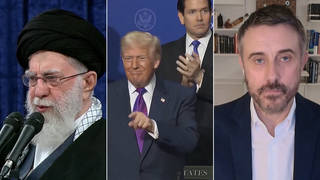
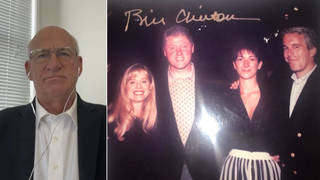
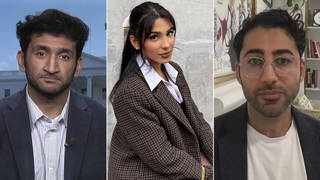






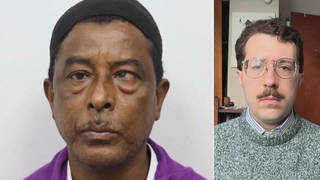
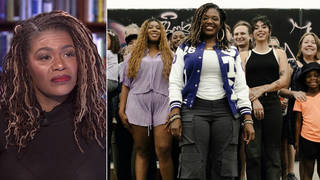
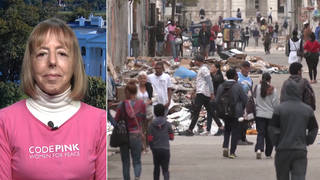
Media Options